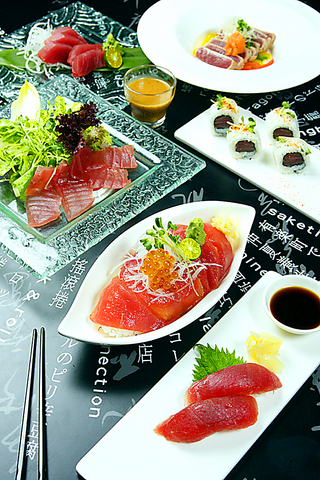The Grand Formosa Regent Hotel is hosting the Toro Tuna Feast through May, and each of the hotel's restaurants is offering creations made from the finest tuna catch shipped immediately from Pingtung County.
The prices are more than reasonable -- in fact, for the quality of the raw fish, anything less than a plane ticket to Japan would be fair.
I sampled three dishes at Azie Grand Cafe in the atrium of the hotel and first tried the featured dish, the select toro sashimi (NT$350 per slice). Toro is the most valuable meat on a tuna and makes up only 8 percent of the fish, and the sashimi managed to blow my high expectations out of the water. The chilled raw fish began melting under my tongue before I chewed or even applied any pressure to the meat. The hotel said it's like butter, but that analogy does no justice to the way the meat seemed to thaw. It was perfect with a dab of soy sauce flavored by wasabi.

PHOTO COURTESY OF GRAND FORMOSA REGENT
I cleaned my palate with fresh ginger before trying the spicy tuna rolls and tuna sushi, two of each for NT$380. The four pieces make a light meal and the contrasting flavors complement each other nicely. With such a range of taste, the set can go with any other tuna selection at the hotel.
The meat for these pieces was from the back of a tuna fish, where the meat is soft but doesn't have much fat. Because it's less oily than toro, it goes well with rice and is best used in rolls and sushi. The darker back meat used in the roll was firm and gave weight to the intangible zing of the shichimi (
That spice balanced the mild-flavored toro sashimi and created a good segue between the select toro sashimi and the tuna sushi, whose jolt of wasabi came at just the right time, after the mild slabs of light pink meat gave way.
The regular sushi was not as soft as the toro, but was softer and lighter than the slices used for the rolls. Head chef Ono Katsuya from Japan was careful to match the right meat for each type of preparation.
The tuna steak with garlic, onion, and ponzo sauce (NT$380) was the last item I tried. The steak is served in a row of triangular slices, each cooked so they are edged in a uniform trim of white and are left pink inside. The ponzo sauce comes on the side and is poured over the fish right before eating. Each slice held a range of flavors, softness and color because of the precise cooking, and with the ponzo sauce and peppers, this meal flaunted the versatility of tuna.
Reservations, which are recommended on weekends, can be made at any of the hotel's eateries.

June 2 to June 8 Taiwan’s woodcutters believe that if they see even one speck of red in their cooked rice, no matter how small, an accident is going to happen. Peng Chin-tian (彭錦田) swears that this has proven to be true at every stop during his decades-long career in the logging industry. Along with mining, timber harvesting was once considered the most dangerous profession in Taiwan. Not only were mishaps common during all stages of processing, it was difficult to transport the injured to get medical treatment. Many died during the arduous journey. Peng recounts some of his accidents in

“Why does Taiwan identity decline?”a group of researchers lead by University of Nevada political scientist Austin Wang (王宏恩) asked in a recent paper. After all, it is not difficult to explain the rise in Taiwanese identity after the early 1990s. But no model predicted its decline during the 2016-2018 period, they say. After testing various alternative explanations, Wang et al argue that the fall-off in Taiwanese identity during that period is related to voter hedging based on the performance of the Democratic Progressive Party (DPP). Since the DPP is perceived as the guardian of Taiwan identity, when it performs well,

The Taiwan People’s Party (TPP) on May 18 held a rally in Taichung to mark the anniversary of President William Lai’s (賴清德) inauguration on May 20. The title of the rally could be loosely translated to “May 18 recall fraudulent goods” (518退貨ㄌㄨㄚˋ!). Unlike in English, where the terms are the same, “recall” (退貨) in this context refers to product recalls due to damaged, defective or fraudulent merchandise, not the political recalls (罷免) currently dominating the headlines. I attended the rally to determine if the impression was correct that the TPP under party Chairman Huang Kuo-Chang (黃國昌) had little of a

At Computex 2025, Nvidia CEO Jensen Huang (黃仁勳) urged the government to subsidize AI. “All schools in Taiwan must integrate AI into their curricula,” he declared. A few months earlier, he said, “If I were a student today, I’d immediately start using tools like ChatGPT, Gemini Pro and Grok to learn, write and accelerate my thinking.” Huang sees the AI-bullet train leaving the station. And as one of its drivers, he’s worried about youth not getting on board — bad for their careers, and bad for his workforce. As a semiconductor supply-chain powerhouse and AI hub wannabe, Taiwan is seeing